Deck 9: Alkynes: an Introduction to Organic Synthesis
Question
Question
Question
Question
Question
Question
Question
Question
Question
Question
Question
Question
Question
Question
Question
Question
Question
Question
Question
Question
Question
Question
Question
Question
Question
Question
Question
Question
Question
Question
Question

Unlock Deck
Sign up to unlock the cards in this deck!
Unlock Deck
Unlock Deck
1/31
Play
Full screen (f)
Deck 9: Alkynes: an Introduction to Organic Synthesis
1
Specify the hybridization on the carbons shown in the following structure. 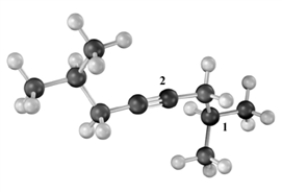
A)1: sp3 2: sp2
B)1: sp2 2: sp.
C)1: sp3 2: sp
D)1: sp2 2: sp

A)1: sp3 2: sp2
B)1: sp2 2: sp.
C)1: sp3 2: sp
D)1: sp2 2: sp
1: sp3 2: sp
2
Draw: 3,10-dimethyl-6-sec-butylcyclodecyne
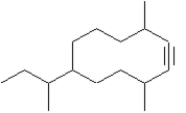
3
Consider the three structures shown below.  Explain why Structure C is unstable
Explain why Structure C is unstable
 Explain why Structure C is unstable
Explain why Structure C is unstableThe hybridization on the carbon atoms of the triple bond is sp and produces a bond angle of 180°.This dictates a linear geometry about both carbon atoms of the triple bond.In Structure C the internal bond angles between the sp hybridized carbon atoms and the adjacent sp3 carbon atoms of the ring is much less than 180° (approximately 120°).This compression of the bond angle produces too much strain for the ring to be stable.Puckering of the ring cannot relieve the strain to the degree that is does for Structures A and B.The linear geometry is required to allow for the appropriate orbital overlap to form the sigma bonds between the sp carbon atoms and the sp3 carbon atoms.
4
Exhibit 9-1
The compound below has been isolated from the safflower plant.Consider its structure to answer the following question(s).

Refer to Exhibit 9-1.What is the degree of unsaturation for this compound?
The compound below has been isolated from the safflower plant.Consider its structure to answer the following question(s).

Refer to Exhibit 9-1.What is the degree of unsaturation for this compound?

Unlock Deck
Unlock for access to all 31 flashcards in this deck.
Unlock Deck
k this deck
5
Exhibit 9-1
The compound below has been isolated from the safflower plant.Consider its structure to answer the following question(s).

Refer to Exhibit 9-1.Assign E or Z configuration to each of the double bonds in the compound.
The compound below has been isolated from the safflower plant.Consider its structure to answer the following question(s).

Refer to Exhibit 9-1.Assign E or Z configuration to each of the double bonds in the compound.

Unlock Deck
Unlock for access to all 31 flashcards in this deck.
Unlock Deck
k this deck
6
Exhibit 9-5
To answer the following question(s) consider this reaction:

Refer to Exhibit 9-5.The key intermediate in the electrophilic addition reaction shown above is called:
A)an acetylenic carbocation
B)a vinylic bromide
C)a secondary carbocation
D)a vinylic carbocation
To answer the following question(s) consider this reaction:

Refer to Exhibit 9-5.The key intermediate in the electrophilic addition reaction shown above is called:
A)an acetylenic carbocation
B)a vinylic bromide
C)a secondary carbocation
D)a vinylic carbocation

Unlock Deck
Unlock for access to all 31 flashcards in this deck.
Unlock Deck
k this deck
7
Exhibit 9-2
To answer the following question(s),consider the information below:
The heat of hydrogenation of 1,4-pentadiene is 254.4 kJ/mol.The heat of hydrogenation of 1-pentyne is approximately 292.9 kJ/mol.
Refer to Exhibit 9-2.Show the energy differences between the hydrogenation of 1,4-pentadiene and 1-pentyne on a reaction energy diagram.
To answer the following question(s),consider the information below:
The heat of hydrogenation of 1,4-pentadiene is 254.4 kJ/mol.The heat of hydrogenation of 1-pentyne is approximately 292.9 kJ/mol.
Refer to Exhibit 9-2.Show the energy differences between the hydrogenation of 1,4-pentadiene and 1-pentyne on a reaction energy diagram.

Unlock Deck
Unlock for access to all 31 flashcards in this deck.
Unlock Deck
k this deck
8
Draw: 4-bromo-3,3-dimethyl-1-hexen-5-yne

Unlock Deck
Unlock for access to all 31 flashcards in this deck.
Unlock Deck
k this deck
9
Exhibit 9-5
To answer the following question(s) consider this reaction:

Refer to Exhibit 9-5.On the structures provided,draw arrows showing the electron flow for the reaction mechanism for the electrophilic addition of hydrogen bromide to 1-hexyne.

To answer the following question(s) consider this reaction:

Refer to Exhibit 9-5.On the structures provided,draw arrows showing the electron flow for the reaction mechanism for the electrophilic addition of hydrogen bromide to 1-hexyne.


Unlock Deck
Unlock for access to all 31 flashcards in this deck.
Unlock Deck
k this deck
10
Exhibit 9-2
To answer the following question(s),consider the information below:
The heat of hydrogenation of 1,4-pentadiene is 254.4 kJ/mol.The heat of hydrogenation of 1-pentyne is approximately 292.9 kJ/mol.
Refer to Exhibit 9-2.Which structure is more stable,1,4-pentadiene or 1-pentyne? Briefly explain your answer.
To answer the following question(s),consider the information below:
The heat of hydrogenation of 1,4-pentadiene is 254.4 kJ/mol.The heat of hydrogenation of 1-pentyne is approximately 292.9 kJ/mol.
Refer to Exhibit 9-2.Which structure is more stable,1,4-pentadiene or 1-pentyne? Briefly explain your answer.

Unlock Deck
Unlock for access to all 31 flashcards in this deck.
Unlock Deck
k this deck
11
Draw: ethynylcyclopropane

Unlock Deck
Unlock for access to all 31 flashcards in this deck.
Unlock Deck
k this deck
12
Exhibit 9-3
Consider an unknown with the molecular formula C4H6.
Refer to Exhibit 9-3.How many degrees of unsaturation are present?
Consider an unknown with the molecular formula C4H6.
Refer to Exhibit 9-3.How many degrees of unsaturation are present?

Unlock Deck
Unlock for access to all 31 flashcards in this deck.
Unlock Deck
k this deck
13
Exhibit 9-1
The compound below has been isolated from the safflower plant.Consider its structure to answer the following question(s).

Refer to Exhibit 9-1.What is the molecular formula for this natural product?
The compound below has been isolated from the safflower plant.Consider its structure to answer the following question(s).

Refer to Exhibit 9-1.What is the molecular formula for this natural product?

Unlock Deck
Unlock for access to all 31 flashcards in this deck.
Unlock Deck
k this deck
14
Exhibit 9-3
Consider an unknown with the molecular formula C4H6.
Refer to Exhibit 9-3.Draw six of the nine possible structures with this formula.
Consider an unknown with the molecular formula C4H6.
Refer to Exhibit 9-3.Draw six of the nine possible structures with this formula.

Unlock Deck
Unlock for access to all 31 flashcards in this deck.
Unlock Deck
k this deck
15
Name: 


Unlock Deck
Unlock for access to all 31 flashcards in this deck.
Unlock Deck
k this deck
16
Exhibit 9-1
The compound below has been isolated from the safflower plant.Consider its structure to answer the following question(s).

Refer to Exhibit 9-1.Provide the name for this unusual natural product.
The compound below has been isolated from the safflower plant.Consider its structure to answer the following question(s).

Refer to Exhibit 9-1.Provide the name for this unusual natural product.

Unlock Deck
Unlock for access to all 31 flashcards in this deck.
Unlock Deck
k this deck
17
Name: 


Unlock Deck
Unlock for access to all 31 flashcards in this deck.
Unlock Deck
k this deck
18
Draw the structure(s) of the product(s) formed when the following substance is treated with NaNH2/NH3 and 1-bromo-3-methylhexane. 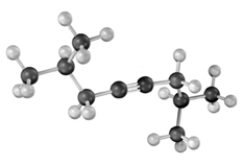


Unlock Deck
Unlock for access to all 31 flashcards in this deck.
Unlock Deck
k this deck
19
Draw: acetylene

Unlock Deck
Unlock for access to all 31 flashcards in this deck.
Unlock Deck
k this deck
20
Draw the skeletal formula for the reactant and product that correspond to the enol formed in a hydroboration/oxidation reaction.Atoms other than carbon and hydrogen are labeled. 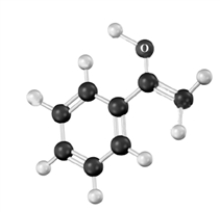


Unlock Deck
Unlock for access to all 31 flashcards in this deck.
Unlock Deck
k this deck
21
Consider the following compound. 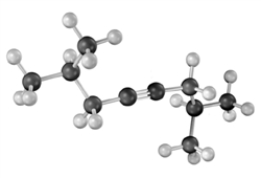 This compound
This compound
A)is weakly acidic.
B)could produce a single carboxylic acid upon oxidation.
C)would produce a high yield of product upon oxidative cleavage.
D)yields an alkene upon treatment with hydrogen in the presence of a Lindlar catalyst.
E)None of the above characterize this compound
 This compound
This compoundA)is weakly acidic.
B)could produce a single carboxylic acid upon oxidation.
C)would produce a high yield of product upon oxidative cleavage.
D)yields an alkene upon treatment with hydrogen in the presence of a Lindlar catalyst.
E)None of the above characterize this compound

Unlock Deck
Unlock for access to all 31 flashcards in this deck.
Unlock Deck
k this deck
22
Draw the mechanism of the lithium/ammonia reduction of 2-butyne to produce trans-2-butene.

Unlock Deck
Unlock for access to all 31 flashcards in this deck.
Unlock Deck
k this deck
23
The term retrosynthesis refers to syntheses developed:
A)starting with simple molecules.
B)devised by examining the product.
C)working forward and backward from intermediates.
D)beginning by examining the reactant available.
A)starting with simple molecules.
B)devised by examining the product.
C)working forward and backward from intermediates.
D)beginning by examining the reactant available.

Unlock Deck
Unlock for access to all 31 flashcards in this deck.
Unlock Deck
k this deck
24
What is the term given to the following species? 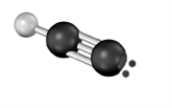
A)carbene
B)carbanion
C)acetylide anion
D)carbocation

A)carbene
B)carbanion
C)acetylide anion
D)carbocation

Unlock Deck
Unlock for access to all 31 flashcards in this deck.
Unlock Deck
k this deck
25
What is the skeletal formula for the product of the reaction when the following is treated with BH3 in THF followed by H2O2? 
A)
B)
C)
D)

A)

B)

C)

D)


Unlock Deck
Unlock for access to all 31 flashcards in this deck.
Unlock Deck
k this deck
26
When the following substance is treated with 1 equivalent of Br2, 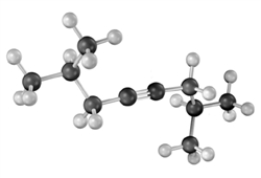 The product of the reaction is
The product of the reaction is
A)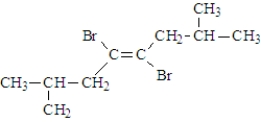
B)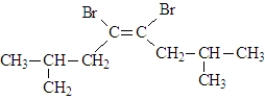
C)
D)A mixture of a and b would be produced.
 The product of the reaction is
The product of the reaction isA)

B)

C)

D)A mixture of a and b would be produced.

Unlock Deck
Unlock for access to all 31 flashcards in this deck.
Unlock Deck
k this deck
27
An acetylide anion is more stable than either a vinylic or alkyl anion due to
A)the stabilization of the negative charge in orbitals with higher s character.
B)the greater distance of the negative charge from the nucleus of the carbon atom.
C)the greater stability of an sp hybrid orbital.
D)the larger number of π electrons.
A)the stabilization of the negative charge in orbitals with higher s character.
B)the greater distance of the negative charge from the nucleus of the carbon atom.
C)the greater stability of an sp hybrid orbital.
D)the larger number of π electrons.

Unlock Deck
Unlock for access to all 31 flashcards in this deck.
Unlock Deck
k this deck
28
Draw the mechanism of the alkylation of acetylide anion with chloroethane to give 1-butyne.

Unlock Deck
Unlock for access to all 31 flashcards in this deck.
Unlock Deck
k this deck
29
When the following substance is treated with excess HBr, 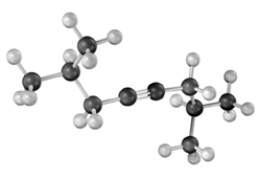 The product of the reaction is
The product of the reaction is
A)
B)
C)
D)A mixture of a and b would be produced.
E)A mixture of a,b,and c would be produced.
 The product of the reaction is
The product of the reaction isA)

B)

C)

D)A mixture of a and b would be produced.
E)A mixture of a,b,and c would be produced.

Unlock Deck
Unlock for access to all 31 flashcards in this deck.
Unlock Deck
k this deck
30
Draw the mechanism of the bromination of acetylene.

Unlock Deck
Unlock for access to all 31 flashcards in this deck.
Unlock Deck
k this deck
31
Which of the following alkynes will produce a single product upon mercury(II)-catalyzed hydration?
A)2-methyl-5-ethyl-3-heptyne
B)3,3-dimethyl-1-heptyne
C)3-hexyne
D)2-hexyne
E)Both 3,3-dimethyl-1-heptyne and 3-hexyne
A)2-methyl-5-ethyl-3-heptyne
B)3,3-dimethyl-1-heptyne
C)3-hexyne
D)2-hexyne
E)Both 3,3-dimethyl-1-heptyne and 3-hexyne

Unlock Deck
Unlock for access to all 31 flashcards in this deck.
Unlock Deck
k this deck



